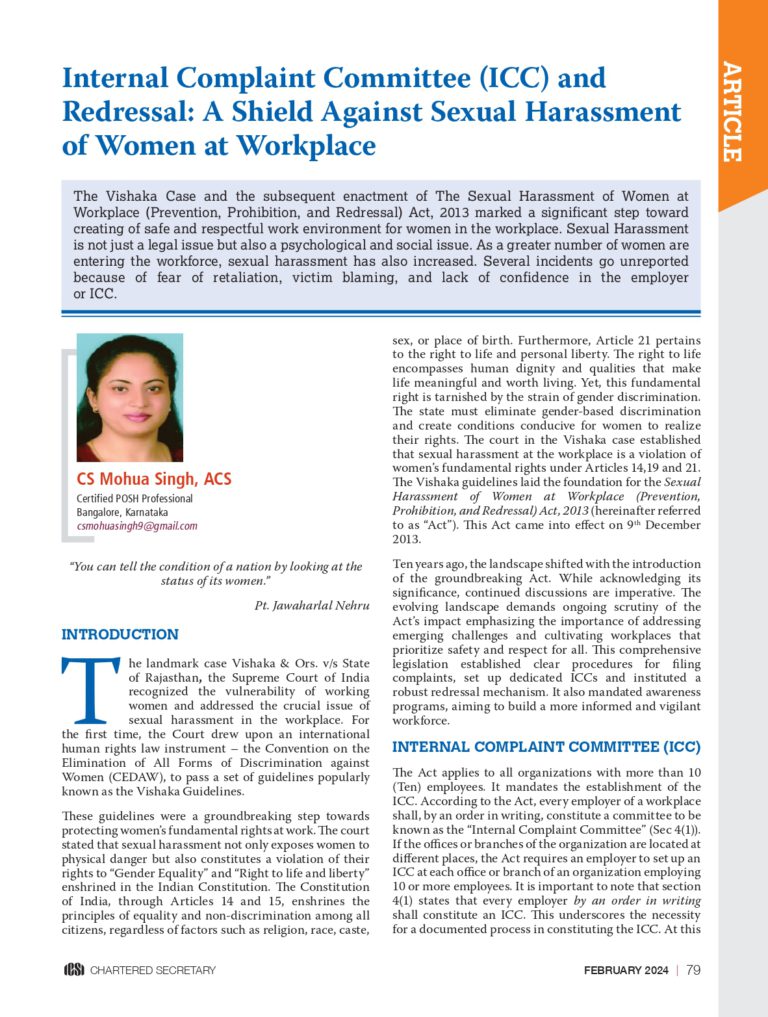Sexual Harassment of Women at Workplace – The Legal Framework
3. Indian Penal Code, 1860.
Under Section 19(g) &(h) of the POSH Act, 2013 – The Employer is obliged to do the following:
– provide assistance to the woman if she so chooses to file a complaint in relation to the offence under the Indian Penal Code (45 of 1860) or any other law for the time being in force.
– cause to initiate action, under the Indian Penal Code (45 of 1860) or any other law for the time being in force, against the perpetrator, or if the aggrieved woman so desires, where the perpetrator is not an employee, in the workplace at which the incident of sexual harassment took place.
The IPC provisions which may be used in the case of sexual harassment at the workplace are given in the following table.
| Sections 107-109 | Abetment |
| Sections 120A and 120B | Criminal conspiracy |
| Section 166A | Public servant disobeying direction under law |
| Sections 292-294 | Obscenity |
| Section 306 | Abetment of suicide |
| Sections 319-331 | Relating to hurt and grievous hurt |
| Sections 326A and 326B | Causing grievous hurt by use of acid, etc. |
| Sections 339-348 | Wrongful restraint and wrongful confinement |
| Section 354 | Assault or use of criminal force to woman with intent to outrage her modesty |
| Section 354A | Sexual harassment |
| Section 354B | Assault or use of criminal force with intent to disrobe |
| Section 354C | Voyeurism |
| Section 354D | Stalking |
| Section 375 and related provisions | Rape |
| Section 376C | Sexual intercourse by a person in authority |
| Sections 415-417 | Cheating |
| Sections 499-500 | Defamation |
| Sections 503, 506 and 507 | Criminal intimidation |
| Section 509 | Word, gesture or act intended to insult the modesty of a woman |
| Section 511 | Attempt to commit an offence. |
It is the well-known case of Vishaka vs. State of Rajasthan in which the Supreme Court of India expressed its serious concern over sexual harassment. The Court stated that where conduct amounts to a specific offence under Indian Penal Code or any other law, the employer is under legal obligations ―to initiate appropriate action in accordance with law by making a complaint with the appropriate authority. Thus, when a prima facie criminal case exists, the committee should pass on the complaint within 7 days to the police for criminal action under IPC.
4. Other Laws.
The Contract Act:
The doctrine of Good Faith ‘Uberrima Fidei’ is an integral part of every contract. Creating a hostile environment, asking for sexual favour, termination of service for rejecting sexual favour, or any such unwelcome behaviour that creates and uncomfortable environment is breach of doctrine of good faith. Hence, in such situation damage can be claimed by aggrieved woman.
Law of Torts:
Tort is a legal wrong, other than a breach of contract, allowing courts to grant legal remedy often through monetary damages. Tort law encompasses both negligence and intentional harm. Sexual Harassment qualifies as an intentional tort. Victims can pursue assault, battery, defamation, emotional distress, and invasion of privacy claims. Indian Tort Law permits actions for assault, emotional distress, and employer failure to ensure a safe work environment. Both the harasser and employer may be jointly liable. The former directly and the latter vicariously, particularly in cases of assault.
The National Commission of Women Act, 1990
The statement of objects and reasons of the act states:
“Successive commissions on women had noted in their reports the unequal status of women obtaining in every sphere of life and had suggested the setting up of an agency to fulfil the surveillance functions as well as to facilitate redressal of their grievances. The country cannot progress as long as the inequality persists with reference to half of its population. …the main task of the commission shall be to study and monitor all matters relating to the constitutional and legal safeguards provided for women, to review the existing legislations, and to suggest amendments wherever necessary. It will also look into the complaints and take Suo motu notices of the cases involving deprivation of the rights of women to provide support, legal or otherwise, to helpless women. The commission shall monitor the proper implementation of all the legislations made to protect the rights of women to enable them to achieve equality in all spheres of life and equal participation in the development of the nation.”
The primary objective of the National Commission of Women is to safeguard women’s rights, seek justice for women, and promote women’s empowerment. The commission has all the power of the civil court in trying suits.
The Protection of Human Rights Act, 1993:
The Protection of Human Rights Act, 1993, was enacted in India to uphold international commitments and reinforce constitutional mandates.
“Human Rights’’ means the rights relating to life, liberty, equality and dignity of the individual guaranteed by the Constitution or embodied in the International Covenants and enforceable by courts in India.
Sexual Harassment of women at the workplace is violation of right to live with dignity and respect. Each Employer should be committed to provide all its employees, equal opportunity and harassment free workplace, notwithstanding race, caste, religion, colour, gender, sexual orientation, ethnic origin, and disability.
By safeguarding the vulnerable section of society, this Act reflects India’s dedication to protecting and promoting human rights, both domestically and in line with its international obligations, contributing to a comprehensive framework for justice and the well-being of its citizens.
The Information Technology Act, 2000
The Delhi High Court in Saurabh Kumar Mallick v. Comptroller & Auditor General of India (2008) observed that “A person can interact or do a business conference with other people while sitting in some other country by means of videoconferencing. It is also becoming a trend that office is run by certain CEOs from their residence. Obviously, members of the public would not have access to that place, though the personal staff of such an officer would be present there. In a case like this if such an officer indulges in an act of sexual harassment with an employee, say, his private secretary, it would not be open for him to say that he had not committed the act at ‘workplace’, but at his ‘residence’ and get away with the same.”
Therefore, it would be wrong to assume that protection against sexual harassment extends to women within physical space. Sexual harassment occurring in digital space comes under the definition of workplace.
Crimes over the internet could be the nature of cyberstalking, cyberbullying, cyber harassment, voyeurism, violation of privacy, etc. Section 66E, 67, and 67A of the Information Technology Act are some sections of the Information Technology Act, 2000 as amended by the Information Technology Act 2008 that deal with such crimes.
… to be continued




